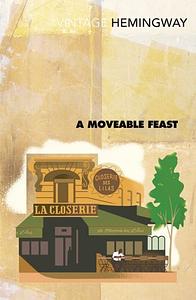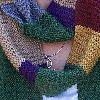Take a photo of a barcode or cover
I love the way that Hemingway writes, clean & beautiful. "His talent was as natural as the pattern that was made by the dust on a butterfly's wings." Just wonderful. I love his thoughts on writing ("All you have to do is write one true sentence. Write the truest sentence you know.") and the reflections on life as well as life in Paris. My least favorite parts were when he was writing about the other writers in Paris, as the ironies of some of the things he had to say about others are easy to see in hindsight.
I think I enjoyed this almost more than any of his other books. I am glad that I read it after "The Paris Wife" because I had a better sense of context and what he was referring to when he talked about Hadley, their time in Austria, Fitzgerald and Pauline. Clearly those days troubled him and stayed with him for all of his life and this was one way to purge his demons.
tense
medium-paced
A little taste of Paris in the 20s. I especially liked his perspective on the time, learning more about Fitzgerald, and of course, my favorite bits were when he talked about the Shakespeare and Company bookstore! :) Also very interesting to read this after The Paris Wife.
The fun stories and great simple writing of this book push it to a 4, despite the boring racing stories trying to pull it down.
4 stars because he cheated on his wife but a fun read otherwise
Hemingway's 'A Moveable Feast' is both charming and insightful. Charming in that one is filled with glee at the recognition and appearances of places and author's that Hemingway talks of, reflecting on famous characters of the time such as Scott F. Fitzgerald and Ezra Pound. Insightful in that it does not only give an engaging account of Paris in the 1920's but also delves into Hemingway's own struggles with starting out as a writer, one of the most notable quotes from the text being 'All you have to do is write one true sentence. Write the truest sentence that you know' in relation to having what is regarded as writer's block. The text towards the end however, as it moves away from Paris and towards the life of Ernest and Hadley in the mountains, does slow down a little compared to the quick attention drawn towards his experiences in the city. This sleight setback is not without cause on the other hand, as at the end Hemingway wraps the text up brilliantly in a quick reflection on his relationship with the city and how he and it changes. In conclusion the text presents an individual reflection on what was the most iconic of times, the reader being given a privileged seat into the most private of details.
Made me feel nostalgic for 1920’s Paris. An autobiographical journey of Hemingways early experiences living with his wife and meeting Picasso and Scott F Fitzgerald.
“But this is how Paris was in the early days when we were very poor and very happy.”
“But this is how Paris was in the early days when we were very poor and very happy.”
Hmmm. It's always embarrassing to me when I don't "get" a classic. I feel like I need a literature teacher to explain why Hemingway's writing style is so great. I know he worked hard to eliminate all description, but why? I miss it.
I hate Hemingway a little less now. I kind of sort of got used to his writing style towards the end of the book and wasn’t so distracted by it. The book was an interesting glimpse into the Jazz age in Paris, which honestly seemed mostly to be characterized by excessive drinking and drug use. It seems like all the famous artists of that time were troubled, I suppose much like they are now. I didn’t get a great sense of what kind of person Hemingway was, how he viewed the scenes he describes. Some dialogue was unnecessary and some places where it was necessary it was left out. I was also hoping for more food descriptions, given the title. And I was totally lost towards the end when he was talking about a pilot fish.




